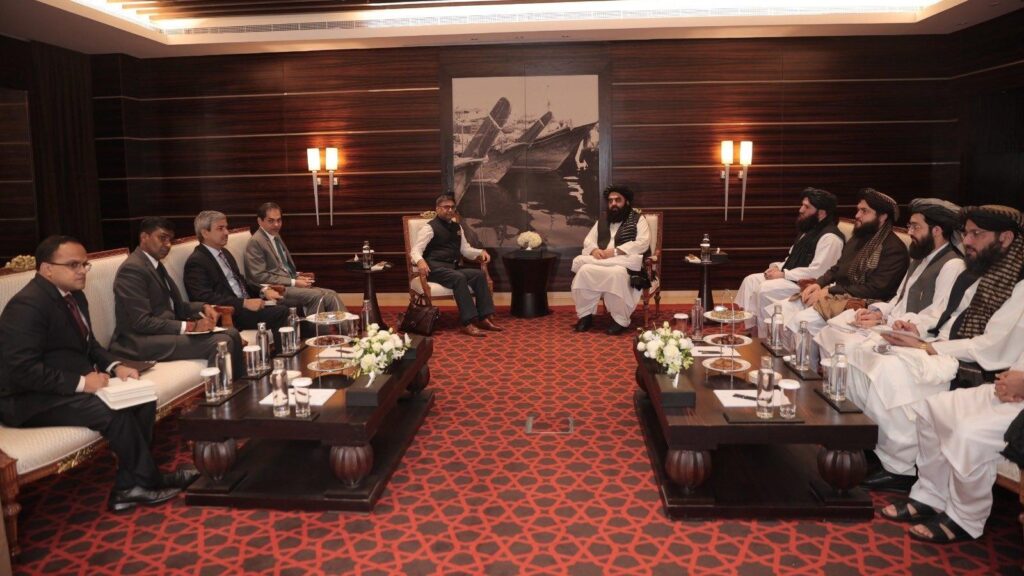India has taken a significant step in reshaping its regional diplomacy by engaging with the Taliban-led government of Afghanistan. For the first time since the Taliban took control of Kabul in 2021, India held high-level talks, marking a pivotal moment in its foreign policy.
What Happened?
On January 8, 2025, Foreign Secretary Vikram Misri met with Afghanistan’s Taliban Defense Minister, Mullah Yaqoob Muttaqi, in Dubai. The discussions focused on:
- Humanitarian Aid: Continued support for Afghanistan’s pressing needs. India’s extensive aid to Afghanistan includes a wide range of critical supplies:
- Food Security: 50,000 MTs of wheat
- Medical Assistance: 300 tons of medicines, 1.5 million doses of the COVID-19 vaccine, and 100 million polio doses
- Disaster Relief: 27 tons of earthquake relief materials
- Drug De-addiction Support: 11,000 hygiene kits
- Winter Clothing: 500 units
- Educational Supplies: 1.2 tons of stationery kits
- Trade Expansion: Promoting trade through the strategically important Chabahar Port.
- Healthcare: Strengthening Afghanistan’s healthcare infrastructure.
- Refugee Rehabilitation: Addressing the needs of displaced Afghan populations.
- Sports Cooperation: Enhancing collaboration in cricket, a sport cherished in Afghanistan.
- Development Projects: India reaffirmed its commitment to future developmental initiatives in Afghanistan.
- Addressing Security Concerns: Afghanistan acknowledged India’s security sensitivities, emphasizing the need for mutual cooperation. Both sides committed to maintaining regular diplomatic engagement to address shared concerns and strengthen ties.
This meeting signals a new dimension in India’s foreign policy, cementing its role as a constructive partner in Afghanistan’s rebuilding process.
India’s Official Position
The Ministry of External Affairs described the meeting as a vital step in addressing Afghanistan’s humanitarian, developmental, and security needs. India underscored its commitment to:
- Supporting Afghanistan’s recovery through developmental and humanitarian assistance.
- Promoting trade and commerce via the 628 km Chabahar-Zahedan rail line, a key transit route for Afghanistan’s trade.
- Assisting in strengthening healthcare systems and rehabilitating refugees.
Foreign Minister Muttaqi expressed gratitude for India’s continued engagement and acknowledged its leadership in aiding the Afghan people.
India’s Concerns: Women’s and Minority Rights
India raised concerns over:
- The Taliban’s restrictions on women’s education and employment.
- The rights and representation of minorities in Afghanistan.
These issues have been consistently highlighted by India, reiterating its commitment to democratic principles and human rights.
Why Now? Reasons Behind India’s Strategic Move
India’s engagement with the Taliban comes at a critical juncture in geopolitics. Key factors include:
- Changing Regional Dynamics:
- Pakistan’s Weakening Influence: Strained relations between Pakistan and the Taliban have created opportunities for India.
- Iran’s Reduced Role: Regional turbulence has diminished Iran’s ability to influence Afghanistan.
- Global Focus Elsewhere: With Russia focused on its war and the US navigating internal politics, India seized the chance to fill the diplomatic void.
- China’s Growing Role:
- China’s increasing ties with Afghanistan, including exchanging ambassadors, posed a challenge to India’s influence.
- Preserving Investments:
- India has invested significantly in Afghanistan over the years, including in infrastructure and humanitarian efforts. Re-engagement ensures that these investments are not wasted.
- Security Concerns:
- Preventing Afghanistan from becoming a safe haven for anti-India terrorist groups remains a core priority.
India’s Persistent Efforts Since 2021
India’s engagement with the Taliban has evolved over time:
- August 2021: India’s ambassador to Qatar, Deepak Mittal, met Taliban representatives in Doha.
- June 2022: J.P. Singh, Joint Secretary in the Ministry of External Affairs, held meetings with Taliban leaders.
- Indian Embassy in Kabul: India stationed a technical team in Kabul, facilitating consistent engagement.
These initial low-key efforts paved the way for the high-level talks in Dubai.
Pakistan’s Concerns
India’s growing engagement with Afghanistan has alarmed Pakistan, which is already grappling with:
- Internal instability: Frequent terrorist attacks and governance challenges.
- Strained relations with the Taliban: Pakistan accuses the Taliban of harboring anti-Pakistan terrorist groups.
India’s constructive role in Afghanistan, juxtaposed with Pakistan’s deteriorating ties, has added to Islamabad’s geopolitical challenges.
Closing Remarks
India’s proactive engagement with Afghanistan under the Taliban demonstrates its pragmatic approach to regional diplomacy. By focusing on trade, humanitarian aid, and security, India is positioning itself as a reliable partner in Afghanistan’s reconstruction.
This strategic move not only strengthens India’s influence in the region but also ensures that its national security and developmental interests are safeguarded in a rapidly evolving geopolitical landscape.
Also Read: Trump Shares Video Insulting Netanyahu: Analysis and Implications
Disclaimer: This article is based on news reports and information available at the time of writing. The facts may evolve as further investigations unfold.
Follow Fusion IAS

